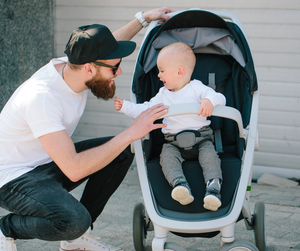What are colicky babies?
Introduction
Generally, infants cry excessively, and it is normal. They call to express themselves in terms of needs or wants. They cry when they are hungry, wet, tired, need some attention, or overstimulated.
Colicky babies are healthy and well-fed babies who frequently cry for a prolonged time without apparent reasons and remain inconsolable for hours before stopping. They scream for more than three hours a day, three days a week, for at least one to three weeks . However, when babies cry abnormally for an extended period, it calls for a question.
Some healthy babies also have colicky symptoms. Their cause is unknown; some experts link the condition to intestinal distress stemming from a food allergy or sensitivity, overfeeding or underfeeding, and improper digestion.
In this discourse, we shall be looking at coping with colicky babies and a host of others.
Colic help
Since colic is not a medical condition, some of the following techniques can give relief to your colicky baby :
- Lay them on their belly across your lap or stomach while rubbing their back
- Carry them warmly to your body for a prolonged time
- Move them repeatedly in a baby swing.
- Activate a white noise machine
Colicky child
A colicky child is an infant who is healthy or not hungry but cries too much for no apparent reason. They can fuss for more than three hours a day, more than three days a week for one to three weeks. Colic is a common condition that fizzles out on its own when your baby is three or four months old .
What is colicky pain?
Colicky symptoms some infants exude are indicative of intestinal discomfort, which stems from:
- A food allergy or reaction
- Overfeeding or underfeeding
- Scanty burping
- Improper digestion
- Bloated abdomen
- Gassing. Use waistband relieve
The condition may also arise from your baby's immature nervous system, making them sensitive to noise, temperature, and light intensity.
Colic and breastfeeding
Some babies suddenly show colicky symptoms when two weeks old, not attributed to any medical condition. However, some breastfeeding-related problems could contribute to signs of colic. The mother's diet plays a role in developing colic since whatever they eat goes to their bodies through breast milk. Some babies react or have allergies to certain substances .
Colic home remedies
Apart from the simple techniques in soothing your colicky baby, some home remedies below will suffice:
- For breastfed babies, you may eliminate certain foods from your diet, including allergic dairy products.
- Give your infant gripe water to cushion abdominal cramps.
Take cognizance of what soothes your baby. Discuss with your pediatrician before considering any remedy.
Coping with colicky baby
If your doctor says there is no underlying medical condition causing your baby's fussiness, try the following to reduce colic:
- Anytime they cry, respond swiftly to make them feel safe and secure.
- Breastfeed your crying baby, even when not hungry
- Burp your baby when necessary
- Use a pacifier
- Carry them close to your body , etc.
Why are babies colicky at night?
According to one study, colic results from an imbalance of the brain chemicals, serotonin, and melatonin, where the former peak in the evening . The study further revealed that the imbalance naturally resolves when babies start producing melatonin (responsible for the relaxation of intestinal muscles).
Growth spurt-hunger, slower milk letdown, overstimulation are also some of the causes of fussiness at night.
Is colicky baby genetic?
Even though a significant percentage of normal healthy infants develop colic, there is no evidence that colicky baby is hereditary. The condition, which is now well understood, does not indicate any long-term health condition. Parents and caregivers cannot entirely ascertain the exact causes of colic.
Colic symptoms to watch out for
All babies cry, but if you notice the following, your child is colicky:
- Cries with no reason like being hungry or having a dirty diaper
- It's challenging to soothe them
- Your baby clenches their fists
- Their faces turn red
- They bring their knees forward to their bellies or arch their back.
- Their stomach rumbles
Is there a diagnosis for colic?
There is no proven test for colic. Your pediatrician will only rely on their symptoms and medical history by conducting a physical examination, focusing on the following:
· Their level of energy
· Breathing
· Tone of skin
· Weight
· Body temperature
Your doctor might recommend some tests to rule out another medical challenge.
What are the risk factors for colic?
Risk factors for colic are not determinate because research had not shown differences in risks when it considered the under listed factors:
- Sex of child
- Full-term and preterm pregnancy
- Breastfed or formula-fed babies
When will my infant outgrow colicky at night?
When your baby becomes colicky in the evening, the first signal you will get is when they are two to three weeks old. This interval brings about a growth spurt and increased frequent feeding. The peak of colicky in many infants occurs at age six weeks with the hope of the end in sight, around three to four months old .
What causes colic?
No doctor or researcher knows for sure what causes colic in some babies. Some theories suggest the following factors behind it:
- A growing digestive system with muscles that suddenly contracts involuntarily.
- Hormones that cause stomach pain
Underdeveloped
- nervous system
- Early childhood migraine
- Sensitivity to light or noise
- Gassing
- Fear or excitement
How is colic in infants treated?
It is pleasing to note that most infants outgrow colic when they are three or four months old . While you wait for this phase to pass, try some of these strategies to soothe your child:
- walk, rock, or give your baby a ride
- Rub your child's tummy
- If you are breastfeeding, try to modify your diet
Conclusion
When babies cry, it is not always colic. If a baby is growing well and not eating satisfactorily, then they are not colicky. A medical condition may be impeding the feeding. If this happens, inform your pediatrician.
Colic is a common condition estimated to affect up to one in every five healthy babies during their first few weeks. It affects both sexes, and it is not proven to be hereditary. Colic is a prolonged round of crying with no apparent reasons that usually lasts for weeks or months.
Colicky symptoms in babies may include the following:
- Your baby clenches their fists
- Their faces turn red
- They bring their knees forward to their bellies or arch their back.
- Their stomach rumbles
Proves show that some home remedies like an elimination diet and gripe water for colic are effective.
Links
1.https://www.nhs.uk/conditions/colic
2.Yum Yum Mama White Noise Player Machine (yumyum-mama.com)
3.https://www.healthline.com/healthy/children-health/best-colic-remedies
5. https://www.verywellfamily.com/colic-and-the-breastfed-baby-4157979
6.https://parents.com/baby/care/colic/colic-101-what-is-and-what-to-do
7.https://www.romper.com/p/is-colic-genetic-its-something-many-parents-wonder-24029
8. https://mayoclinic.org/diseases-conditions/colic/symptoms-causes
9. https://www.healthline.com/health/baby/fussy-baby-at-night#causes
10. https://www.healthline.com/health/colicky-pain#treatment-in-babies





